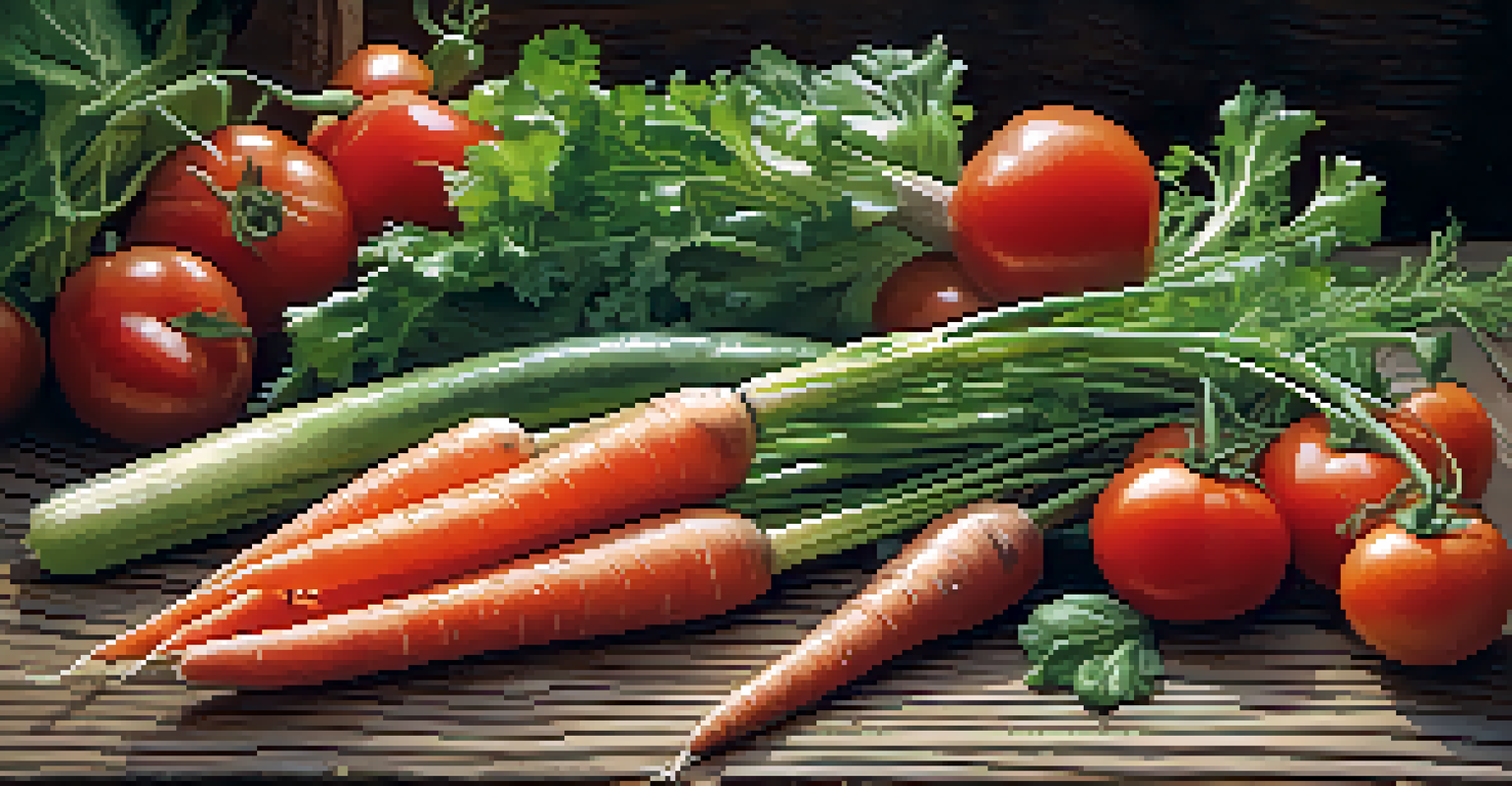The Role of Organic Farming in a Raw Food Lifestyle

What is Organic Farming and Its Principles?
Organic farming is a method that emphasizes natural processes and the use of organic materials. Unlike conventional farming, it avoids synthetic fertilizers and pesticides, focusing instead on crop rotation, green manures, and composting. This approach not only promotes environmental sustainability but also aims to produce healthier food.
The future will be green, or not at all.
The principles of organic farming are rooted in the belief that healthy soil leads to healthy plants and, ultimately, healthy humans. By nurturing the ecosystem, organic farmers strive to maintain biodiversity and reduce pollution. This philosophy aligns closely with raw food diets, which prioritize fresh, unprocessed ingredients.
In essence, organic farming is about creating a balanced ecosystem that supports both plant and animal life. This balance is crucial for anyone pursuing a raw food lifestyle, as it ensures access to high-quality, nutrient-dense produce that is free from harmful chemicals.
The Connection Between Organic Farming and Raw Foods
Raw food diets consist primarily of uncooked fruits, vegetables, nuts, and seeds, which are often best when sourced organically. The connection between organic farming and raw foods is significant, as organic produce tends to be fresher and more flavorful. This is essential for raw food enthusiasts who value taste and nutrition.

Moreover, organic farming practices often lead to higher nutrient content in crops. This is due to the absence of chemical fertilizers, which can sometimes result in lower nutrient levels in conventionally grown produce. For individuals committed to a raw food lifestyle, organic options provide a way to maximize the health benefits of their diet.
Organic Farming Boosts Nutrition
Organic produce tends to be fresher and richer in nutrients, making it ideal for those following a raw food diet.
Additionally, supporting organic farming can foster a closer relationship with local food systems. Many raw foodists prefer to shop at farmers' markets or join community-supported agriculture (CSA) programs, which often feature organic produce. This not only supports local farmers but also promotes sustainable food practices.
Benefits of Organic Produce for Raw Food Enthusiasts
Choosing organic produce offers several benefits for those following a raw food lifestyle. One of the most significant advantages is the reduction of pesticide exposure. Since raw foodists consume fruits and vegetables in their natural state, opting for organic can help minimize potential health risks associated with chemical residues.
You are what you eat. What would you like to be?
Organic fruits and vegetables are also often richer in antioxidants and vitamins compared to their conventionally grown counterparts. This is particularly important for raw food enthusiasts who rely on these nutrients for overall health and well-being. By choosing organic, they ensure that they are getting the most out of their meals.
Furthermore, many raw food advocates appreciate the taste of organic produce. Because organic farming focuses on soil health and biodiversity, the resulting fruits and vegetables often have a more robust flavor. This enhanced taste can make raw meals more enjoyable and satisfying.
Challenges of Sourcing Organic Ingredients
While the benefits of organic farming are clear, sourcing organic ingredients can pose challenges for those committed to a raw food lifestyle. Availability can be an issue, especially in regions where organic farming is less common. Raw food enthusiasts may need to seek out specialty stores or farmers' markets to find the products they need.
Cost is another consideration. Organic produce typically comes with a higher price tag due to the more labor-intensive farming practices. This can be a barrier for some individuals, making it essential to find ways to budget for organic options or explore local farms that offer competitive pricing.
Supports Sustainable Practices
Choosing organic ingredients helps reduce environmental pollution and promotes sustainable farming methods.
Additionally, the seasonal nature of organic farming means that certain ingredients may not always be available. Raw foodists may have to adjust their meal plans based on what's in season, which can require creativity and flexibility in the kitchen. Embracing this challenge can lead to discovering new ingredients and recipes.
The Environmental Impact of Organic Farming
Organic farming has a positive environmental impact that resonates with many raw food lifestyle advocates. By avoiding synthetic chemicals, organic farmers help reduce soil and water pollution, promoting healthier ecosystems. This is an essential aspect for those who care not only about their personal health but also about the health of the planet.
Additionally, organic farming practices often enhance soil health through crop rotation and composting, which can lead to better water retention and reduced erosion. This sustainable approach supports biodiversity, creating habitats for various species, which is crucial for maintaining ecological balance.
For raw food enthusiasts, supporting organic farming means contributing to a more sustainable food system. Every organic purchase can be seen as a vote for environmentally-friendly practices that safeguard the earth for future generations.
Incorporating Organic Foods into a Raw Food Diet
Incorporating organic foods into a raw food diet can be a seamless process with a bit of planning. Start by prioritizing organic fruits and vegetables when shopping. This could involve visiting local farmers’ markets or joining a CSA to ensure a consistent supply of fresh, organic produce.
Experimenting with organic nuts, seeds, and grains can also enhance a raw food diet. These items can be used in various recipes, from smoothies to energy bars, adding texture and nutritional value. By incorporating organic options, you enrich your meals while supporting sustainable practices.
Challenges in Sourcing Organically
Sourcing organic ingredients can be difficult due to availability, cost, and seasonal variations.
Finally, don't forget about herbs and spices! Many raw foodists overlook these flavorful additions, but organic herbs can elevate dishes while providing extra health benefits. Adding fresh herbs to salads or smoothies can make a significant difference in taste and nutrition.
Conclusion: Embracing Organic Farming in Your Raw Journey
Embracing organic farming within a raw food lifestyle can lead to a healthier, more sustainable way of living. The synergy between organic produce and raw foods enhances both the nutritional value and enjoyment of meals. By prioritizing organic options, you contribute to your health and support environmentally-friendly practices.
As you navigate your raw food journey, consider the importance of sourcing high-quality ingredients. This not only impacts your health but also supports the community of organic farmers who are dedicated to sustainable practices. Making conscious choices about food can lead to a more fulfilling lifestyle.

Ultimately, the role of organic farming in a raw food lifestyle is about connection—connecting with the earth, with local farmers, and with the food you consume. By choosing organic, you’re not just nourishing yourself; you’re participating in a movement that values health, sustainability, and community.